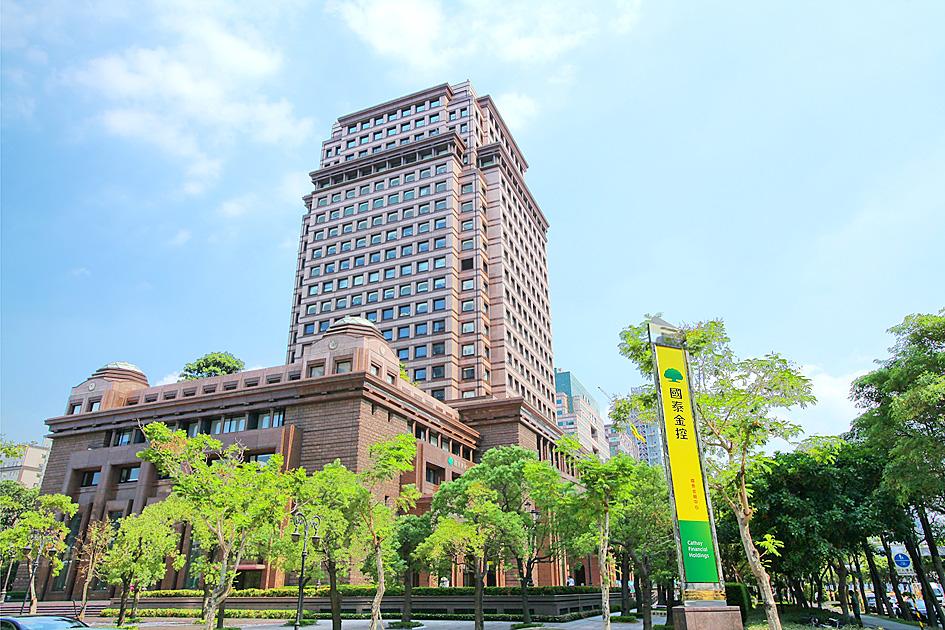Fubon Financial Holding Co (富邦金控), the nation’s second-largest financial conglomerate by assets, yesterday reported annual growth of 21.8 percent for last month with a net profit of NT$16.16 billion (US$583.6 million).
The company posted NT$122.3 billion in net profit for the first eight months, the highest among all local financial service providers, company data showed.
Earnings per share were NT$11.69 for the first eight months of the year, making Fubon the most profitable financial holding company in Taiwan.

Photo courtesy of Cathay Financial Holding Co
It attributed the growth to contributions from Fubon Life Insurance Co (富邦人壽), the profit of which expanded 18 percent year-on-year to NT$11.72 billion.
Taipei Fubon Commercial Bank (台北富邦銀行) and Fubon Securities Co (富邦證券) also reported an improvement in net profit, it said.
Fubon Life continued to realize capital gains despite volatility on the local stock market last month, benefiting from dividend income and lower foreign exchange hedging costs, the company said in a statement.
First-year premiums (FYP) last month were NT$10.9 billion, up 32.3 percent annually, while cumulative FYPs were NT$121.4 billion for the first eight months, up 2 percent year-on-year, it said.
Fubon Life had a net profit of NT$89.92 billion for the first eight months of the year, up 109 percent from a year earlier, it said.
Taipei Fubon Bank’s net profit rose 16 percent to NT$2.07 billion due to investment gains, while Fubon Securities registered annual growth of 35 percent with net earnings of NT$741 million despite lower turnover in the local stock market, it said.
Fubon Financial recognized a gain of NT$260 million from newly acquired Jih Sun Financial Co (日盛金控), which made a net profit of NT$458 million last month, company data showed.
Fubon Financial completed the acquisition of Jih Sun at the end of last month, giving it a 56.92 percent share of the company.
Separately, Cathay Financial Holding Co (國泰金控), the nation’s largest financial services provider by assets, posted cumulative net profit of NT$114 billion, or earning per share of NT$7.92, for the first eight months of the year, company data showed.
Cathay Financial’s net profit last month fell 15 percent to NT$10.88 billion from NT$12.79 billion a year earlier, after Cathay Life Insurance Co (國泰人壽) reported an annual decline of 24.8 percent in net profit to NT$8.06 billion, offsetting growth from other units, such as Cathay United Bank (國泰世華銀行), corporate data showed.
Cathay Financial was heavily reliant on Cathay Life for growth.
Cathay Life did not report why its net profit declined last month year-on-year, only saying in a statement that its FYPs tallied NT$17 billion, ranking first among life insurers, and that its investment division would boost investment gains through agile investing, despite volatile financial markets.
It had dividend income of NT$6.1 billion last month and expected it to total NT$18.5 billion to NT$19.5 billion for the whole of the year, it said.

In Italy’s storied gold-making hubs, jewelers are reworking their designs to trim gold content as they race to blunt the effect of record prices and appeal to shoppers watching their budgets. Gold prices hit a record high on Thursday, surging near US$5,600 an ounce, more than double a year ago as geopolitical concerns and jitters over trade pushed investors toward the safe-haven asset. The rally is putting undue pressure on small artisans as they face mounting demands from customers, including international brands, to produce cheaper items, from signature pieces to wedding rings, according to interviews with four independent jewelers in Italy’s main

Japanese Prime Minister Sanae Takaichi has talked up the benefits of a weaker yen in a campaign speech, adopting a tone at odds with her finance ministry, which has refused to rule out any options to counter excessive foreign exchange volatility. Takaichi later softened her stance, saying she did not have a preference for the yen’s direction. “People say the weak yen is bad right now, but for export industries, it’s a major opportunity,” Takaichi said on Saturday at a rally for Liberal Democratic Party candidate Daishiro Yamagiwa in Kanagawa Prefecture ahead of a snap election on Sunday. “Whether it’s selling food or

CONCERNS: Tech companies investing in AI businesses that purchase their products have raised questions among investors that they are artificially propping up demand Nvidia Corp chief executive officer Jensen Huang (黃仁勳) on Saturday said that the company would be participating in OpenAI’s latest funding round, describing it as potentially “the largest investment we’ve ever made.” “We will invest a great deal of money,” Huang told reporters while visiting Taipei. “I believe in OpenAI. The work that they do is incredible. They’re one of the most consequential companies of our time.” Huang did not say exactly how much Nvidia might contribute, but described the investment as “huge.” “Let Sam announce how much he’s going to raise — it’s for him to decide,” Huang said, referring to OpenAI

The global server market is expected to grow 12.8 percent annually this year, with artificial intelligence (AI) servers projected to account for 16.5 percent, driven by continued investment in AI infrastructure by major cloud service providers (CSPs), market researcher TrendForce Corp (集邦科技) said yesterday. Global AI server shipments this year are expected to increase 28 percent year-on-year to more than 2.7 million units, driven by sustained demand from CSPs and government sovereign cloud projects, TrendForce analyst Frank Kung (龔明德) told the Taipei Times. Demand for GPU-based AI servers, including Nvidia Corp’s GB and Vera Rubin rack systems, is expected to remain high,